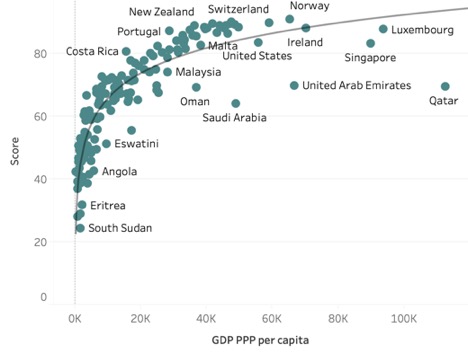“Value will change in the post-covid world. On one level, that’s obvious: valuations in global financial markets have imploded, with many suffering their sharpest declines in decades. More fundamentally, the traditional drivers of value have been shaken, new ones will gain prominence, and there’s a possibility that the gulf between what markets value and what people value will close.” – Mark Carney
For those of us not on the front line of responding to Covid-19, the lockdown has given us time to reflect. In some respects the crisis has shone a light on what is really important to us and what we value most. What we value will vary between individuals, depending in part on the circumstances in which they find themselves, but are there any common threads?
In the 1940s Abraham Maslow identified a hierarchy of needs, starting with the basic needs (food, water, warmth, rest, safety, security) and psychological needs (relationships, recognition, esteem) that require to be more or less satisfied to provide the foundation upon which an individual can realise their full potential. Subsequent iterations of the model included cognitive needs (knowledge, understanding, meaning etc.) and aesthetic needs (search for beauty etc.).
In their book ‘How Much is Enough?’ Robert and Edward Skidelski explore similar ground in trying to identify the ‘basic goods’ they feel are the key contributors to a ‘good life’. The characteristics of their basic goods are that they should be universal, final (not just means to other goods), not part of other goods and indispensable. Using these criteria they identify seven basic goods:
- Health – a full functioning of the body
- Security – undisturbed by war, crime or major social and economic upheaval
- Respect – regarding interests and views as worth of consideration
- Personality – autonomy, spontaneity, a private space to be oneself
- Harmony with nature
- Friendship – robust, affectionate relationships
- Leisure – activity in its own right without compulsion
Another way of beginning to answer the question of what is important is by asking people directly. This was the approach taken by Oxfam in Scotland in developing their ’Humankind Index’. In 2011 they worked with over 3000 people across a range of communities in Scotland to identify what they needed to live well. The top five factors identified were:
- a decent, affordable safe home
- physical and mental health
- a clean and healthy neighbourhood
- satisfying work
- good relationships
Looking at these different approaches a clear picture begins to emerge of what is important for human wellbeing and a good life and for laying thefoundations for realizing human potential.
The flip side is also clear, if the necessary foundations for a good life aren’t there, then not only will individual wellbeing be compromised and potential unrealised, there will also be wider implications for society. As Sendhil Mullainathan and Eldar Shafir pointed out in their book ‘Scarcity: Why having too little means so much’, when resources are scarce survival instincts come to the fore and wider, longer term considerations are likely to be crowded out.
In a recent Core Solutions and Collaborative Scotland webinar on Covid-19 and the climate emergency, Alastair McIntosh drew the distinction between the ‘wants’ of the more fortunate and ‘needs’ of those less well off, when linking the growth in consumerism to the increased demand for fossil fuels. We seem to adapt quite quickly to more and accept it as the norm and develop new wants (often as a result of active encouragement) that need to be satisfied to maintain levels of happiness. What were yesterday’s luxuries quickly become today’s necessities.
This ties in with the observation that at low levels of income there is a strong relationship between improvements in wellbeing (measured either subjectively or objectively) and income growth, but as income increases, and the material needs of Maslow’s hierarchy are met, this appears to weaken as diminishing returns set in (sometimes called the ‘Easterlin Paradox‘), particularly where there is greater inequality within a country. A similar relationship has been shown between national income and the Social Progress Index made up of a range of indicators including basic human needs, environmental quality and opportunity (see chart below).

Mediators are skilled in exploring the distinction between underlying needs and presenting wants in individual cases. Perhaps we can use these skills more widely to get beneath the surface as humanity tries to tackle big issues like the climate emergency and inequality.
To quote two modern day philosophers, who performed at the recent ‘One World Together: At Home’:
“You can’t always get what you want
But if you try sometime
You just might find you get what you need”
________________________
To make sure you do not miss out on regular updates from the Kluwer Mediation Blog, please subscribe here.



Great article. I think the highlighting of inequality is very important. For me the other important things Covid has highlighted are people’s sense of belonging and the importance of fairness.